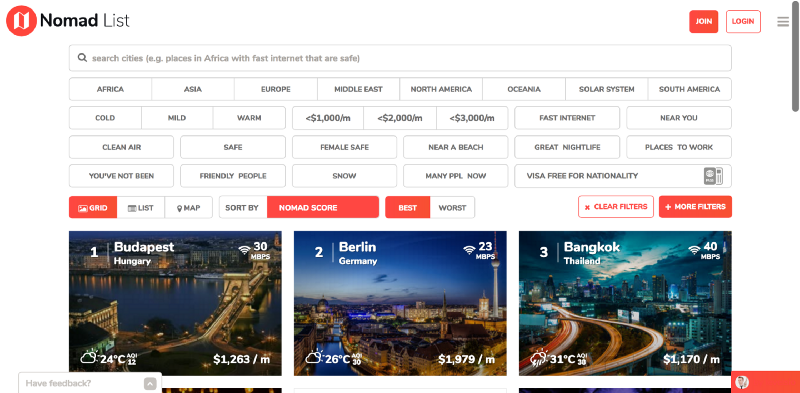by Iskender Piyale-Sheard
How to travel the world as a developer

We’ve all seen it. That Facebook photo of a friend posing on a paradisiacal beach — with a laptop and a coconut drink — and the caption: “my office for the day.”
For a lot of people, this is living the dream. And it’s not hard to see why.
Having a job that allows you to make your own hours and travel at the same time is pretty cool. But it’s not always easy.
So let’s talk about how you can get started. We’ll discuss some of the best resources you can take advantage of, and some things to watch out for along the way.
Set Realistic Expectations of Remote Work
First off, let’s get one thing straight. The beach is an awful place to work. You may have tried it once or twice to make all of our friends back home jealous of your incredible new lifestyle. But the fact of the matter is:
- The beach has no WiFi.
- Sand and salt mess up your computer (sand + magsafe adapter = no fun)
- You get horrible sun glare on your monitor.
And there are a hundred other reasons why you don’t actually want to try and work on a beach.
The reality of remote work is you’ll probably be spending most of your time in cafes, co-working spaces, public areas with wifi, and at home. And that’s great! There’s nothing wrong with that!
And for the record, all those people posting ridiculous photos of their “office for the day” are mostly full of it.
Take it from me — I’ve personally gone to these sorts of satirical extremes:

Challenges That Remote Developers Face
Some of the biggest challenges that remote developers face while working abroad are:
- Unreliable/slow wifi
- Finding consistent places to work (daytime/nighttime)
- Being surrounded by people on vacation (while you need to clock in hours for work)
- Coordinating work with people in different timezones
- Finding places to hop on a call with your coworkers/clients
- Navigating the legal issues around working remotely abroad without a work permit
- Staying focused while making your own hours
These may not seem like particularly big challenges at first, but when you’re on the road for a while they really start to pile up. And the more inconveniences you have, the more difficult it is to keep a steady routine.
What About The Good Stuff?
Now that we’ve cut through a lot of the difficult stuff, why don’t we dig into the juicy bits. What makes remote work great?
Remote work can be extremely rewarding if you get into a good groove with it. One of the best things about it is that even if you are working 40–50 hours week (or often more for business owners), as soon as you’re on a break, you get to pop out for lunch in Japan, or go for an after-work surf in Bali, or zip home on your scooter through some luscious green rice paddies in Vietnam.

You’ll start to notice that even if you don’t have many of the luxuries you might have back home (a car, a 4K TV, your blazing fast wifi, your entire home being automated with a Raspberry Pi), the novelty of living in a drastically different environment is a very fulfilling experience.
It’s really the novelty of all the small interactions you have outside of work, the places you get to explore on evenings and weekends or on a particularly nice afternoon that make remote work extremely satisfying. You get to make friends with locals, learn as much of a new language as you can, and soak in all that incredible culture.
“To my mind, the greatest reward and luxury of travel is to be able to experience everyday things as if for the first time, to be in a position in which almost nothing is so familiar it is taken for granted.” — Bill Bryson
How To Get Started
There are a few ways of going about getting started with remote work — either by getting a new job, taking on freelance work, or negotiating with your boss.

Method #1: Find a remote job on a website like RemoteOK or any one of these 25 other websites.
Method #2: Find some freelance work opportunities through friends and acquaintances to build a client base. Or try websites like Upwork or Toptal.
Method #3: Negotiate a few small baby steps for remote work with your boss, then knock it out of the park. Try a couple days, then push for a couple weeks. Read this Lifehacker article on how to convince your boss.
Word To The Wise (a few little tips)
The biggest factors in making your remote work experience successful is maintaining a balanced healthy and sustainable lifestyle. So start establishing some routines.
Do you normally cook/work out?
Eating out all the time is an easy (and delicious) trap to fall into. Make sure you find ways to keep a healthy diet, and not be too frequently seduced by the tasty but junky tourist food. Work out? Find a gym, go for runs, or find some ways to get that exercise in.
Do you have a routine?
Set some standard office hours for yourself and stick to them. Wake up early and get your brain working, make a cup of tea, go for a walk and get the day started. It’s ok to stray away from the routine here and there but for the most part keep it consistent.
Do you have a steady spot?
Where are you going to be working from day to day? Find a cafe that has decent wifi and is open during the hours you need to work. Not enough? Then get a membership at a co-working space, hint they have awesome places all over the world. Scout out some great spots on Workfrom.
Do you have a vague idea of where to travel to?
You don’t have to have things planned out to a T. But getting some opinions on nice places to go that have reliable internet, great 4G SIM cards (major bonus points for places like Thailand and Taiwan).
The best places to start your search is on NomadList. You can filter by weather, ease of access, cost of living, internet speeds, and much more.

Do you have people around you who are working too?
Hanging around in hostels and the like can be challenging because everyone you’ll meet will likely be on vacation. Not the ideal scenario for you, someone who is trying to take on sustainable long-term travel. Find others like yourself who are working remotely and you’ll benefit immensely.
Learn From Others
Over the course of your travels, you’ll meet lots of incredibly talented developers and entrepreneurs. One thing I’d emphasize more than anything else I’ve mentioned so far is to take advantage of opportunities to meet them.
Check out Meetup.com and find events near you. Go to co-working spaces and find local startups to meet with.

Being exposed to developers and entrepreneurs from all over the world is one of the most educational and rewarding experiences you’ll have. It will open your mind to diverse perspectives, philosophies, and expertise. There’s really nothing like it.
What About Co-working Retreats?
Some people call them co-working retreats, others call them co-workations. There are a million different names for these types of events.
One way or another, you’ve probably heard murmurs or gotten ads on Facebook about how to travel around the world for a year with a group of like-minded people. As a matter of fact, that’s how I started my work-travel adventure. For a year, I was the Trip Facilitator for a group called Hacker Paradise.
Today, these types of retreats are a dime a dozen. Everyone and their uncle has started some sort of travel+work, yoga+coworking, surfing+coworking retreat, and they can vary significantly in length, quality and price. Here’s a whole list of ones you can check out.
My only word of advice here is be careful and read lots of reviews before making a big commitment.

Recent bootcamp grad? Have a long think about this decision? Immediately delving into long term travel by yourself is probably a mistake. Your biggest goal right now should be to hack on new projects, contribute to open source, and solidify and build upon all the skills you’ve learned.
That being said, while you’re looking for work, joining a co-working retreat for developers for a few weeks could prove to be extremely beneficial. It could get you collaborating with brilliant developers. Together, you could hack on fun projects. You could build an incredible network of people who can share opportunities, connections, and advice.
Long Story Short
Want to work and travel? Awesome! Find a way and make it happen. Talk to successful people you know who’ve done it and ask for advice. Just like learning to code, you have to get comfortable with being uncomfortable.
DRY: Don’t Repeat Yourself. Just like in programming, you don’t need to reinvent the wheel. Take advantage of all the awesome tools and resources people use to make their work/travel lives easier and more effective.
Take advantage of the incredible people you’ll meet and learn from them. Keep those connections close and they will inevitably come back to benefit you later.
Good luck and happy travels! Questions? Feel free to reach me on Twitter @izzydoesizzy.

About Izzy
Iskender Piyale-Sheard (aka Izzy) is the Community Manager at Lighthouse Labs, a web/iOS bootcamp in Canada. In his spare time, he likes to write about career growth, teach himself to code and work on fun community projects.
Find him at: izzydoesizzy.com
